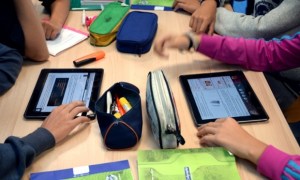The out of control counter-terrorism industry in the UK has a new feature, software that is being sold to schools as a way to fight radicalization by spotting “extremist-related” language among pupils. Truth is stranger than fiction.
By Diane Taylor, The Guardian
Schools are being sold software to monitor pupils’ internet activity for extremism-related language such as “jihadi bride” and “YODO”, short for you only die once.
Several companies are producing “anti-radicalisation” software to monitor pupils’ internet activity ahead of the introduction of a legal requirement on schools to consider issues of terrorism and extremism among children.
Under the Counter-terrorism and Security Act 2015, which comes into force on 1 July, there is a requirement that schools “have due regard to the need to prevent pupils being drawn into terrorism”.
One company, Impero, has launched a pilot of its software in 16 locations in the UK as well as five in the US. Teachers can store screenshots of anything of concern that is flagged up by the software. Other companies offering anti-radicalisation software products to schools include Future Digital and Securus.
Impero has produced a glossary of trigger words such as “jihobbyist” (someone who sympathises with jihadi organisations but is not an active member) and “Message to America” (an Islamic State propaganda video series).
Schools involved with the Impero pilot already have contracts to buy or rent other software from the company, and are trialling the anti-radicalisation software at no extra charge. They are in areas including London, County Durham, Essex, Leicestershire, Warwickshire, Yorkshire and Staffordshire.
A spokeswoman for Impero said: “The Counter-terrorism and Security Act places a duty on schools to prevent people from being drawn into terrorism. Since the introduction of the act at the beginning of the year we have had a lot of schools approach us requesting a keyword-detection policy focused on radicalisation.
“The system may help teachers confirm identification of vulnerable children, or act as an early warning system to help identify children that may be at risk in future. It also provides evidence for teachers and child protection officers to use in order to intervene and support a child in a timely and appropriate manner.
“It is not about criminalising children, it is about helping schools spot the early warning signs so that risk in relation to an individual can be assessed and measured, and counter-narratives and support can be put in place to help educate children before they potentially become victims of radicalisation.”
Different schools are interpreting the anti-radicalisation clause in the new counter-terrorism legislation in different ways. Headteachers interviewed by the Guardian said it was a very difficult issue for schools to get involved with.
Some schools are simply signalling that they are aware of the requirement to take the issue into account, while others are being more proactive. One school is east London is offering workshops on spotting signs of radicalisation.
Monega primary school in Newham has invited parents of children as young as four to a workshop on 26 June. The invitation states: “Come and join us for this session led by a social worker on how to prevent and detect radicalisation. All parents are welcome.”
This is a letter sent to parents of FOUR YEAR olds at Monega School in #Newham as part of a #PREVENT initiative. pic.twitter.com/oAUrEognGF
— Jammy Dodger (@mrjammyjamjar1) June 8, 2015
Yahya Birt, a Muslim academic specialising in British Islam, tweeted about the four-year-olds potentially being monitored for radicalisation: “They’re pre-lingual, let alone pre-political. It’s bonkers.”
@brendan_DB Yes, profiling vs everyone gets checked. But these are toddlers. They’re pre-lingual let along pre-political. It’s bonkers.
— Yahya Birt (@YBirt) June 8, 2015
Last month there was controversy over a questionnaire circulated to pupils in five primary schools in Waltham Forest, another east London borough with a large Muslim population.
The questionnaire asked pupils leading questions about their views and beliefs including whether or not they would marry someone from a different religion, whether they would be prepared to hurt someone who made fun of their race or religion and whether they felt God had a purpose for them.
Waltham Forest council later said the questionnaires would be withdrawn. It said they had been produced by the behavioural insights team, also known as the “nudge unit”, which started life inside 10 Downing Street and is partly government-owned.

